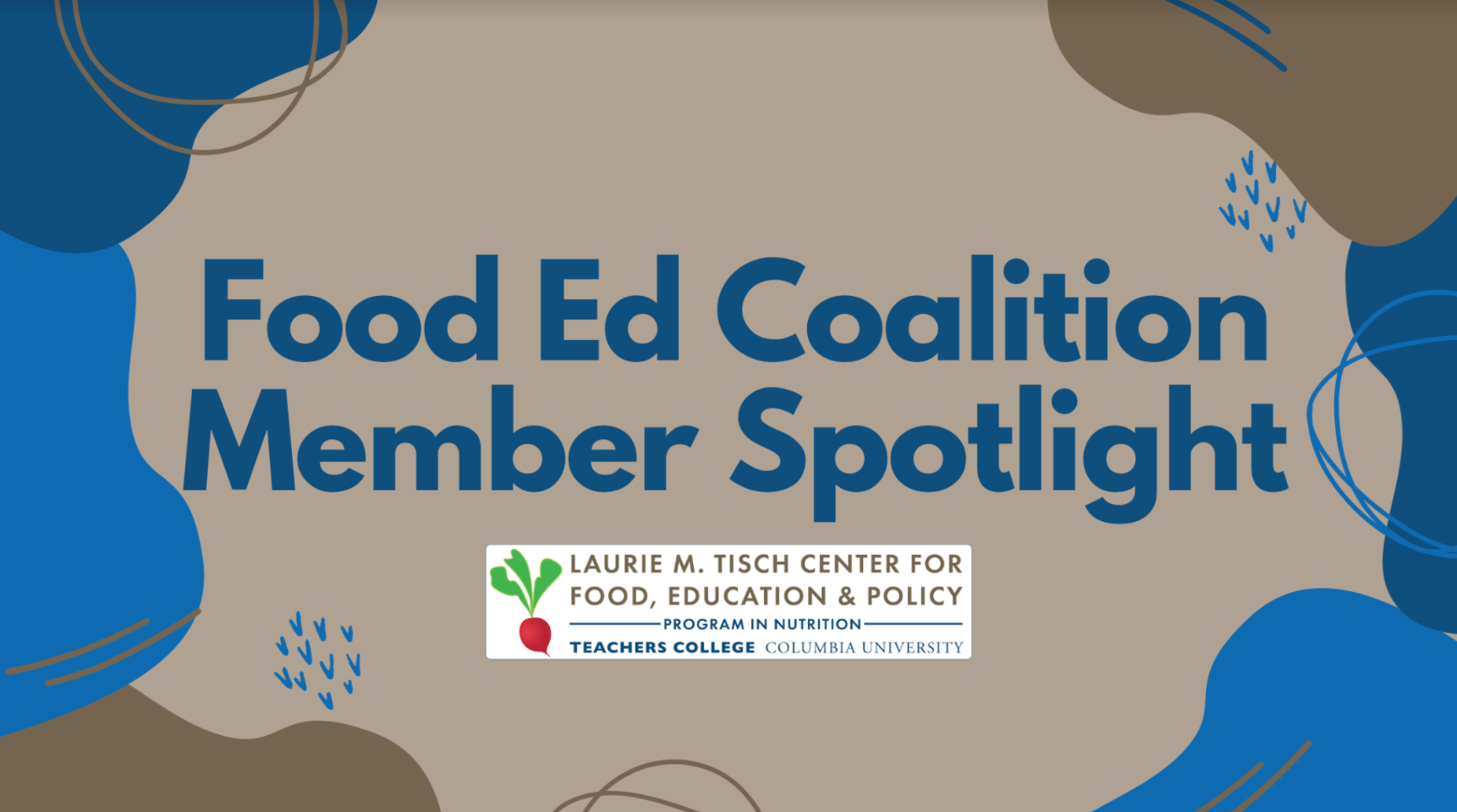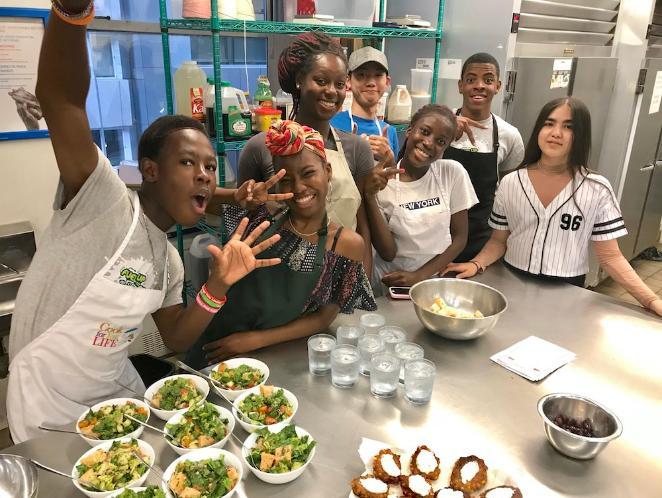The Food Ed Coalition Spotlight Series highlights people and organizations doing amazing work in food education and access in NYC. Find more from the series on the Food Ed Hub.
Quotes have been edited for length and clarity.
Interview with David Bartolomi, Youth Development Director at FamilyCook Productions.
Can you tell us about your career path and your passions that led you to FamilyCook?
I’m the youth development director at FamilyCook Productions, founded by Lynn Fredericks in 1995. I started off in cinema, working in film production, then I became a photographer for most of my life. After photographing Nelson Mandela, who greatly influenced me, I began to move towards social work as I wanted to do something more meaningful. I ended up managing a homeless shelter for youth, and I began to see a connection between food and behavior. I was the only staff person that could cook so the nights that I prepared the food, I noticed that the clients were much more agreeable because the food was homemade and tasted better. I began to see that there’s a connection between food and behavior. After 5 years I left that job and wanted to somehow use my knowledge of food and social work but had no idea where to put it.
The shelter had used one of Lynn’s hands-on nutrition programs, so I contacted her for guidance, but honestly thinking I had nothing to offer her. She had a nutrition education non-profit. She said ‘I work with a lot of young students right out of graduate school but I actually have been waiting for a grown adult male with social work experience’. So I was kind of amazed. I was in my early forties but I still had to intern. I did an internship and it was hugely successful and after that she took me on staff. We thought it would be temporary and now it’s nine years later and I’m the youth development director. So that’s sort of how I got to where I am. I love what I do. I basically combine social work models with nutrition education and achieve sustainable healthy behavior changes in youth.
Can you tell us about FamilyCook and the organization’s impact?
Lynn started FamilyCook out of necessity. She was a single mom with two very young boys, and they were driving her crazy. Trying to make dinner, but being pestered by her children for her attention, she gave them string beans to snap in half. The minute she engaged them in something to do, they completely calmed down and they connected as a family. Although it may sound obvious now, as a new mom this was a new development for her, seeing these kids want to be in the kitchen and want to be next to her. So she began to give them something to do in the kitchen every night. That evolved into the kids getting to choose one night a week what they wanted to cook which also led to field trips to the grocery store where they learned how to shop. It was engaging her children with the common goal of dinner that the kids actually wanted to eat. She surmised ‘maybe I should be doing this in schools with young kids so other mothers can connect with their children.’ In 1995, with her ‘can do’ attitude’, she became a pioneer in bringing teaching kitchens to schools.
What made her different and what makes us different even now, is that she always measured her outcomes. As she began to have more successful outcomes and impacts that were measured, she’d be able to take that data and go to different schools. community centers or hospitals, and say ‘listen, I’ve been doing this work, and these are my outcomes. Let’s collaborate.’ The lack of measured impact and data in our field is shocking. Our programs go deeper so our impacts are stronger. We embed the measures right into the curriculum, so it feels more natural to track the outcomes. We measure participants’ healthy behavior changes around their weight, their diet, nutrition and fitness.
We did an impact study about three years ago, contacting all our partner schools and interviewing all the youth who have participated in our Teen Battle Chef program. We were surprised, our numbers were so high; 74% of our students still had sustained healthy behavior outcomes in their lifestyle, even 7 years post program. 90% had positively influenced family and friends. These numbers uplifted the spirit of our entire team. It convinced us we were on the right track. We all felt more impassioned in our mission.
What does a typical lesson by FamilyCook look like?
The first thing that happens is engagement and team building. We never want these programs to feel like school or that I get up there and talk for two hours or I cook the meal for them. It is engaging them in skill development and in participation, right away. With our teenagers we do a battle with healthy competition. We have two teams battling each other using two different culturally varied recipes. This includes public speaking and presentation. They take it seriously. They really want their dish to be the best dish. Our recipes are from all over the world so youth learn about different cultures. They are plant based, with protein options.
Over the years, Lynn began to discover that there were drivers that impact behavior change. She distilled them to the ten key drivers of behavior change. We presented them at the Harvard Teaching Kitchen Collaborative. These ten drivers work in specific collaboration with each other and absolutely deliver results when used properly. We group them into categories like, engagement, collaboration, skill building, and celebration.
We nudge people out of their comfort zone because that is where the growth occurs. By the time we nudge them, they feel safe enough to leave their comfort zone and explore a little bit of the unknown. Developing their confidence in this manner, isn’t just for the program, it serves them through their entire life. It’s developing them as youth leaders for adult independence. That’s the ultimate goal for me as a youth developer, it’s to make them responsible adults.
One of the kids said, ‘wait, this isn’t really about cooking is it?’ and I said, ‘well, what do you think it’s about?’ He said, ‘this is about making us responsible for ourselves.’ And I was like, ‘yes exactly!’ Once they realized it was about self-accountability and responsibility the whole class began to show up and come together.
We nudge people out of their comfort zone because that is where the growth occurs. By the time we nudge them, they feel safe enough to leave their comfort zone and explore a little bit of the unknown. Developing their confidence in this manner, isn’t just for the program, it serves them through their entire life.
How have your services and programs changed during the pandemic, and what lessons have you learned?
We got the same, if not better, results through the virtual programming that we get in our actual in-person programming, which was a surprise to me. I think a few things contributed to that. There were no distractions from other people in a classroom or from family. Once they were online, they were getting a one-on-one teaching moment with me, with no distractions. They could show me what they were doing, so I could help troubleshoot immediately. With virtual programming we were thrilled because the amount of youth we could reach was infinite.
The only thing we found challenging, and we’re not the only organization, was team building and team work. We still haven’t fully solved it and just breaking out into a chat room is not the same thing as meeting in person as a team, collectively, working together as a team, and negotiating as a team for a final result. That’s the thing I’d still like to crack in a virtual model.
How can people support your work right now?
Lynn has always seen other organizations who do what we do as allies and not competition. There is no use fighting over something if we want the same outcome with the same audience. Most of these other institutions and non-profits don’t have a structured system to measure the impacts and final outcomes. Lynn wants all agencies to agree on common measures for collective impact. It’s very costly to provide this education if there aren’t benchmarks demonstrating success. One of the things that makes us successful is that we can show our accomplishments over two decades of nutrition education and youth development. We are constantly updating our measuring system as we examine the data and improve our methods.
One of the things that makes us successful is that we can show our accomplishments over two decades of nutrition education and youth development. We are constantly updating our measuring system as we examine the data and improve our methods.
Check out some of our other recent Spotlights:

